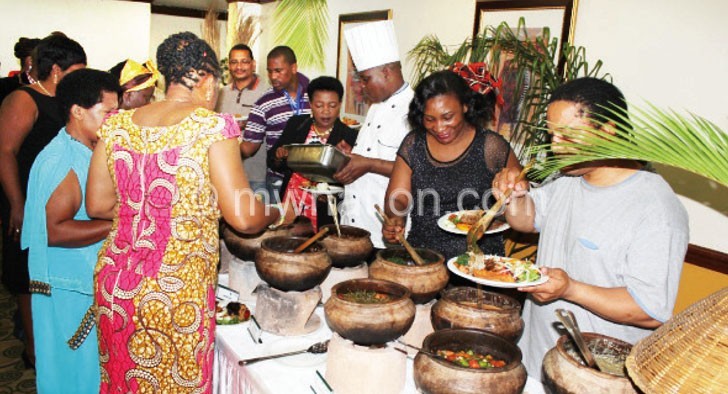Traditional food is alive
If you think Malawi’s traditional foods are extinct, you better think again. Traditional food is alive and Malawians are once again gushing about the pleasure and enjoyment of traditional dishes.
They purr about how in this October heat, sweet brew (thobwa) can easily quench your throat than bottled soda drinks, and how chinaka and chipokolo make good substitutes to meat and soya pieces.

Haselo Nyuzi, 30, who lives in Ndirande Township in Blantyre City is a traditional food lover.
He cherishes every moment he visits his home village Mbedza in T/A Chiwere in Dowa because of the traditional foods that are on offer.
“My village is popular for traditional delicacies such as nkhundi, kachere, matowo, masuku, mpoza, nthudza and mphipsya. These fruits remind me of my childhood when I was living in the village.
“I used to go to a place called Katawa to eat these traditional fruits. Sometimes we could break off from school just to enjoy nthudza in the shrubs of Katawa, recalls Nyuzi.
To him, traditional food stuffs bring a wonderful feeling to him. But says the problem is, Malawians unlike other countries that still value their own traditional foods, have abandoned traditional dishes for western food.
In most homes in the cities, the only surviving traditional food is nsima which is served with beef stew, chicken stew or fish.
“It is rare to see traditional foodstuffs such as therere, nkhwanya, chitambe, nkhwani otendela, chipere and mamuna aligone on the high table. But these are indisputably part of traditional dishes we should value,” Nyuzi says.
According to food experts, traditional foods are affordable as most of them grow naturally in the shrubs or gardens. They are also nutritious and nourish one’s health.
The Lilongwe University of Agriculture and Natural Resources (Luanar) study shows that the market for indigenous vegetables is slowly expanding as more people become aware of the nutritional value of the crops.
In an interview recently, Luanar researcher Sibongile Chimzinga said many people are now aware that indigenous vegetables are more nutritious than exotic ones, hence, the growing demand for them.
“With climate change and the changing taste of people, Luanar is overwhelmed with the demand for indigenous vegetable seed from farmers and nongovernmental organisations.
“Indigenous vegetables are easy to grow, need minimal care, do better with little rains and most of them are resistant to most pests and diseases,” says Chimzinga who is also deputy head of Horticulture Department.
Luanar wants to increase farmers’ knowledge and skills in indigenous vegetable seed production, conservation, utilisation and commercialisation.
“Luanar is encouraging farmers to grow bonongwe, luni, chisoso, mwamunaaligone, chidede, denje, chitambe and others.
This is good news to city dwellers as they will no longer necessarily have to go to the village in order to enjoy traditional food because supermarkets and tourism destinations will be offering local delicacies.
In fact, for uptown folks, Sunbird Tourism Limited says in its hotels traditional food consumption is growing and the hotel-chain has been promoting local dishes through its special traditional meal services.
“Demand is high and guests love the local meals, it seems Malawians are becoming more patriotic and health conscious. They look forward to indulging in foods that are wholesome, organic and prepared in a special way that their grandparents or parents did back home in the village,” says an official in the public relations office of Sunbird Tourism Limited.
Sunbird believes that the younger generation, on the other hand, seems to enjoy experimenting and trying out foods that they did not experience when growing up.
“This speaks a lot of the pride that Malawians have in their local delicacies and it is a good thing. Traditional meal services were introduced due to public demand and judging by the positive response we have had, we will definitely serve authentic Malawian cuisine for a very long time,” the official adds.
Today, Sunbird serves local delicacies ranging from dried fish such as matemba a domasi, smoked kampango, usipa wofutsa, usipa wotendela, mang’ina and nthumbwana (tripe), a variety of local vegetables such as chisoso, bonongwe, kholowa, thelele la denje lofutsa, nsima, chigodo, thobwa, mowa wa masese, chigumuyoyo, mbajila, mbalagha, matoke and nsima ya kondoole.
As if that was not enough, Sunbird has introduced a timetable on traditional foods such as every Wednesdays at lunchtime at Mount Soche, Sunbird Capital has traditional meals on Wednesdays and Fridays at lunchtime, Sunbird Lilongwe serves their meals on Mondays and Thursdays. n





